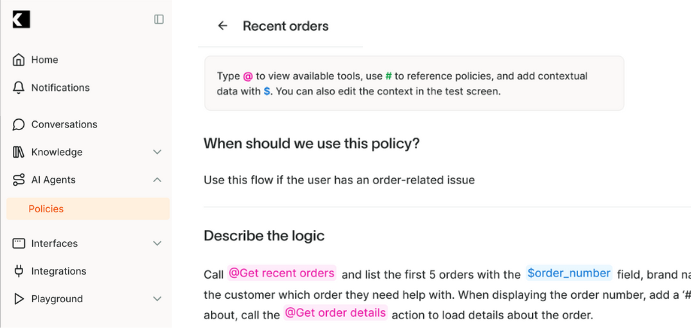Ingredients
Magento, Kustomer, and Kodif.
What are AI Policies?

At Kodif, we’re excited to announce the launch of Policies—a powerful, dynamic solution designed to revolutionize the way CX managers handle customer support. Unlike traditional flows, which are rigid and complex, Policies empower non-technical users to create and manage customer interactions with ease. Written in natural language, Policies make it simple to define and refine customer experiences without needing to rely on complicated flowcharts or scripting. This approach is not only user-friendly but also self-serve, enabling CX teams to quickly translate existing Standard Operating Procedures (SOPs) into automation, saving valuable time and resources.
The flexibility of Kodif Policies ensures that businesses can offer personalized, context-driven support while continuously improving customer experiences. With Policies, you can experiment with different strategies to optimize outcomes such as CSAT, revenue, and retention—all without the need to rebuild complex workflows. Whether it’s automating routine interactions or testing new approaches for high-stakes scenarios, Policies provide a scalable, adaptable solution that aligns with your business goals. While flows still have their place in sensitive, high-risk situations, Policies offer an agile alternative that helps businesses innovate faster and deliver exceptional, tailored experiences at scale.
“Get order info” ticket type explained
In customer support, “Get order info” tickets are requests from customers wanting to know detailed information about their orders. This can include queries about the order status, expected delivery dates, or any tracking details available. Effectively managing these inquiries is crucial as it directly impacts customer satisfaction and trust. Automating responses to these types of requests not only improves efficiency but also enhances the customer experience by providing timely and accurate information.
Which Platforms does this AI policy work on?
This AI policy operates seamlessly on Magento, Kustomer, and Kodif. In fact, Kodif integrates with all other major platforms, providing a unified solution for customer support across various channels and systems.
When should I use this policy?
This policy is particularly useful when customers inquire about the status of their orders, a common scenario in e-commerce known as WISMO (Where Is My Order?). By automating these interactions, businesses can quickly and efficiently provide customers with the information they need, enhancing customer satisfaction and reducing the workload on support teams.
Policy logic
The logic behind this policy involves a series of automated steps designed to handle order information inquiries efficiently. Here’s a breakdown:
- Ask for the user’s email address
- Use @get_magento_account_details to check if the user with that email address exists in Magento.
- If the email address is not found, ask for a valid email address.
-
If the email address is still not found, route it to an agent for further investigation.
-
Display Recent Orders:
- Use @get_magento_orders to retrieve the user’s recent orders.
- Display the list of recent orders and ask the user which specific order they would like to inquire about.
-
If the order was not found, route to an agent for further investigation.
-
Check Order Status:
- For the selected order, retrieve the shipping status using @magento_order_details(order_id: str).
- Depending on the status (e.g., Approved, Processing, Pending Shipment, Shipped, In transit, Delivered, or Canceled), inform the customer accordingly.
- If the order is delayed or was not delivered, route to an agent or create a ticket to escalate for further investigation.
Example policy
Here’s an example of how this policy can be structured:
- Ask for the user’s email address
- Use @get_magento_account_details tool to check if the user with that email address exists in Magento.
- If the email address was not found, ask for a valid email address.
-
If the email address is still not found, route it to an agent for further investigation.
-
Display Recent Orders:
- Use @get_magento_orders to retrieve the user’s recent orders.
- Display the list of recent orders and ask the user which specific order they would like to inquire about.
-
If the order was not found, route to an agent for further investigation.
-
Check Order Status:
- For the selected order, retrieve the shipping status using @magento_order_details(order_id: str).
- Based on the status, provide the relevant information to the customer.
- If the order status indicates a problem (e.g., delay or non-delivery), escalate to an agent.
By following this structured approach, businesses can ensure that customer inquiries are handled efficiently and effectively, leading to improved customer satisfaction and operational efficiency.


